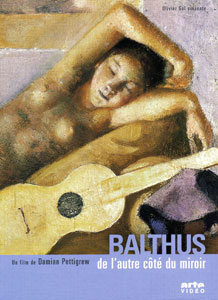Balthus Through the Looking Glass
| Balthus Through the Looking Glass | |
|---|---|
 |
|
| Directed by | Damian Pettigrew |
| Produced by | Olivier Gal, Planète (France) |
| Written by | Damian Pettigrew |
| Starring |
Balthus Philippe Noiret Jean Leymarie Jean Clair François Rouan James Lord Antoinette de Watteville Pierre Rosenberg André Barelier Setsuko and Harumi Klossowska de Rola Stanislaus and Thadée Klossowski de Rola |
| Narrated by | Bernard Verley |
| Music by |
Mozart Faton Cahen |
| Cinematography | Paco Wiser |
| Edited by | Florence Ricard |
| Distributed by | Arte Vidéo |
|
Release date
|
1996 |
|
Running time
|
72 min. |
| Country |
|
| Language |
French English Italian |
| Budget | $450,000 (estimated) |
Balthus Through the Looking-Glass (French: Balthus de l'autre côté du miroir) is a 1996 French documentary film directed by Damian Pettigrew on the French painter Balthus.
The film was honored in a cycle of film classics by Jean Renoir, Marcel Carné, and Jean Vigo at the Museum Ludwig (Cologne, Germany) in September 2007.
The feature length documentary highlights the painter's complex creative process with rare footage of the artist at work in his studio in the Swiss mountain village of Rossinière. Conversations with Balthus and his wife Setsuko, his daughter Harumi, his sons Stanislaus and Thadée, interviews with art critics Jean Leymarie, Jean Clair, Pierre Rosenberg, and James Lord, and with French painter François Rouan (who often assisted Balthus during his tenure at the Villa Medici), contribute to form a psychological portrait of a secretive and controversial artist.
Also featured are photographs by Henri Cartier-Bresson and Irving Penn, and much unpublished material. The film was shot in Super 16 over a 12-month period in Switzerland, Italy, France, and the Moors of England.
The French weekly magazine Télérama described the film as "a beautiful portrait, vibrant, varied and, beyond the magnificent images, tender, respectful, and compelling." "Along with his habits and customs preserved on film," wrote Hervé Gaumont, art critic for Libération, "the master’s slowness is admirably rendered."Le Journal des Arts praised the "subtle approach, neither didactic nor pedagogical, that succeeds in capturing the painter’s intimate world." Art critic Florence Couturiau reviewed the film in Muséart as one "photographed with precision and magic, from Paris to Rome by way of Balthus’s Italian castle. The geometry of the compositions and the subtlety of the painter’s palette shine through each frame of film."Le Figaro regretted the artist’s legendary reserve but admired "a visually stunning documentary that transforms an indiscreet visit into a poetic and analytical portrait... The film examines the cruelty and isolation of Balthus in the light of his close friendship with Artaud who, describing the painter as his double, descended into madness while his twin fled with his sanity still intact. In counterpoint, Philippe Noiret sees in Balthus a surrogate father offering a reassuring affection."
...
Wikipedia
